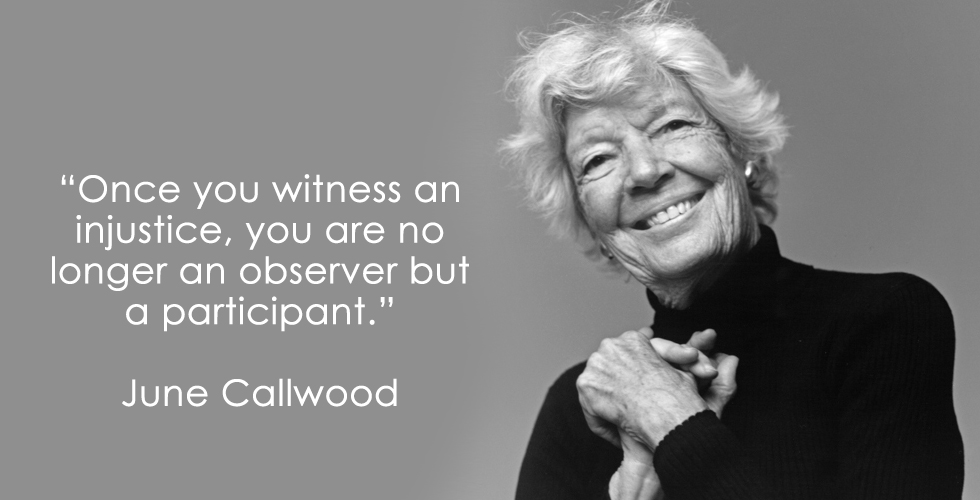
June Callwood
(June 2,1924 – April 14, 2007)
The Road to Kindness
Patrick Conlon
June described Canadian children living in poverty as the country’s ‘invisible citizens’. She knew what she was talking about. She knew firsthand how it felt to be one of them.
Born in Chatham, Ontario, she was forced to quit school at 15 in order to help support her impoverished family. She eventually became a journalist and wrote for various newspapers before being hired by The Globe and Mail where she met and then married Trent Frayne, also a journalist. They raised four children. Their youngest, Casey, was only 20 when he was killed by a drunk driver while returning home from Queen’s University. Casey’s death scarred June for the rest of her life.
Her first public step into social activism occurred unexpectedly in 1968. Toronto’s Yorkville district was then a popular hangout for wannabe hippies, and June happened to be there one night when a riot started. Tension was high and June feared the police would use violence to impose peace. She stepped boldly between the police and the crowd, many of whom were just young tourists from the suburbs. A photo from the Toronto Star archives shows her staring defiantly at the camera from the back of a paddy wagon before she was hauled away.
June went on to become one of Canada’s fiercest and most persuasive advocates for social justice, always driven to help the marginalized and the left behind. She was involved in founding more than 50 social action organizations including Casey House, an AIDS hospice named in honour of her youngest child; Jessie’s, for teen parents; Nellie’s, for abused and homeless women; Maggie’s, for prostitutes; and Digger House, for at-risk teenagers living on the streets. For decades, she was also a persistent supporter of successive campaigns to end child poverty, nabbing every chance to publicly embarrass various levels of government into positive action by arming herself with statistical evidence of Canada’s embarrassing child poverty record on the global stage.
She also built a very successful career as a writer, with more than 30 books and hundreds of magazine and newspaper articles to her credit. But her heart was invested in her social action work and she was acknowledged accordingly, with 16 honorary degrees as well as many other auspicious awards including the Order of Ontario. In 1978, she was made a member of the Order of Canada, then promoted to Officer in 1985, and promoted again to Companion, the Order’s highest rank, in 2000. In 2004, the City of Toronto declared its intention to name a street in her honour and then followed a few years later with a park named after her.
Despite her deep compassion for anyone robbed of justice or fair opportunity, children remained June’s first priority. She may have been the public face for various campaigns to end child poverty but she also worked quietly in the background and away from the lights. One of her favourite personal projects was a pop-up daycare centre in a major Toronto mall. Neighbourhood parents short of money weren’t charged anything to entrust their kids for the day to professional providers.
In her final interview, aired on CBC-TV only days before she died, June was asked what she believed in. Her simple response distilled all of her hard work, all the decades of advocacy and setbacks and triumphs, into four words. “I believe in kindness,” she said. That is her true legacy.
 Keep The Promise
Keep The Promise